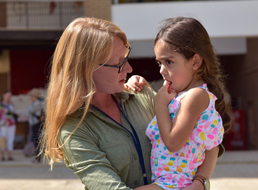USING TEST SCORES TO MEET STUDENTS' NEEDS

Cairo American College (CAC)’s dedicated teachers and administrators work together to implement a dynamic curriculum and provide students with opportunities to continue learning outside of the classroom. The school emphasizes the holistic development of students and strives to support and challenge each individual learner. In pursuit of these goals, CAC uses external assessments to start conversations about how to improve teaching and learning.
As Curriculum Coordinator, David Chadwell “[works] behind the scenes to try to support and align what’s taught.” He also analyzes the results of the assessments that CAC uses to help answer questions like “Why do we do what we do? Are we doing as well as we could be doing?” And, are our students performing as well as they should?
One tool that CAC uses to assess its curriculum is the Measures of Academic Progress (MAP) test. Twice a year, students in grades three to nine take online assessments in reading, language, and mathematics. Students receive a Rasch Unit (RIT) score for every test, and these scores are compared to CAC’s historical averages. The school also calculates grade-level and subject averages and compares its MAP scores to those of regional groups of other international schools.
“What’s really exciting is your spring scores,” Chadwell says. These scores make it possible to see how students have grown during the year. “We can look at those [scores] to see how well we’re meeting the needs of these different groups of kids.”
Chadwell has recently finished analyzing CAC’s MAP scores from Spring 2016. “We were incredibly strong in reading... We’re typically a strong school in the area of reading it seems over time, and this year the growth was just phenomenal.”
Chadwell cited the efforts of CAC’s teachers and the rebalancing of the school’s readers' and writers' workshops as possibly contributing to these scores. Readers' and writers' workshops give students individualized attention. “The teacher provides mini-lessons on specific teaching points, but a lot of work is done in conference and working with the needs of individual students given what they have in front of them, what text they’re reading, what piece of writing that they’re working on.”
Language scores and math scores tend to be strong as well. He explained that in “math overall, we tend to be high in RIT scores, and in Spring 2016, our performance across grade levels was above that of other regional groups.” Ultimately, “our students perform well here. Our students overall have had good gains. Our students overall should be able to transition to the next location [when] they leave CAC.”
MAP scores are a tool that teachers can use to ensure that all of their students are engaged and learning. Teachers spend a lot of time getting to know their classes, and MAP scores can help to confirm their professional judgements about students or prompt them to start asking questions. MAP can also be used to understand groups of students and pair them together during lessons to focus on areas of strength or weakness.
Though he spends much of his time analyzing and drawing meaning from MAP scores, Chadwell also stresses that tests are only one lens through which students can be understood. Scores are based on “one test on one day.” Many factors can affect performance in class and on assessments, and teachers use many different tools to understand their classrooms.
Chadwell also stresses that “CAC is not a high-stakes testing crowd.” Neither students nor teachers are penalized as a result of test scores. Instead, CAC uses test scores to make sure that students’ educational needs are being met. “We try to be data informed, but we are not data driven.”
“[CAC] is such a strong community, residential school, and environment,” says Chadwell. The school strives not only to challenge its students academically but also to support them socially and emotionally. Standardized tests are simply another tool that CAC uses to strengthen its community and ensure that the needs of all students are being met.





